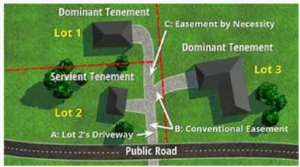THE IMPORTANCE OF REGISTERING ENCUMBRANCES ON LAND.
ENCUMBRANCES
The Land Act 2020(Act 1036) requires certain rights and claims on land to be registered as encumbrances on the land.
Land

What is an Encumbrance?
- It is a right to or interest by one person over another person’s land
- Does not prohibit the passing of title of the land but may diminish its
- They are burdens on land
Types of Encumbrances
Sections 157, 158 and 159 of the Land Act 2020 (Act 1036)
Provides for the registration of an Easement, Restrictive Covenant
and Profit. As encumbrances on land.
- Restrictive
- Profit
Easement
Section 157 (1) provides that:
A grant or reservation of an easement created by an instrument is of no effect unless the grant or reservation is registered as an encumbrance relating to the land burdened by the easement …
Easement
An easement under S 281 of the Land Act 2020 is defined as:
- A right under the rules of common law attached to land which allows the proprietor of the land to which the right is attached to use another land in a particular manner …..
- The land for the benefit of which the right is created is called the dominant land and the land which carries the burden over which the right is exercisable is called the servient land.
Easement

Way of Creating Easements
- Express
- Implied grant
Types of Easements
Express reservation
When a grantor expressly reserves to himself an easement over land which he disposes of.
Implied grant
occurs when a grant of land is made by a grantor to a grantee and the grantee of the land cannot access his land except by going over the land of the grantor or another adjoining land.
In this sense the grantee has an implied right to go through or over the grantor’s land to access his land.
Ways of Creating Easements
Implied Reservation
where a grantor grants land to a grantee in such circumstances where he cannot access the portion, he has retained except by going on the land of the grantee.
Prescription.
This is the situation where a dominant land owner exercises a right over a servient land and has enjoyed the right for a considerable and continuous period as if he were entitled to that right and the dominant land owner has acquiesced to that use.
Restrictive Covenants
- Restrictive covenants are agreements which restrict the use of
- They restrict the building on, or the user or other enjoyment of the land of the proprietor for the benefit of the proprietor of another land
- Because they impose obligations on land for the benefit of another they may be enforced against any occupier of the land provided they are registered pursuant to s 158(1)
Profit
A profit is defined under S 281 of the Act as:
The right at common law to go on the land of another person to take a particular type of object from that land, whether part of the soil or a product of the soil.
- Examples of profits are:
The right to go on someone’s land to graze cattle, to fish from a someone’s pond or pluck fruit from trees from another person’s land.
Profit

Profit
S.159(1) provides that:
The grant of a profit has no effect unless;
- The profit is noted in a register as an encumbrance relating to the land affected by the
- Where the profit is appurtenant to other land, the profit is noted in the
Profit
An instrument granting a profit shall clearly specify:
- The nature of the profit, the period for which the profit is to be enjoyed and the conditions, limitations and restrictions intended to affect the enjoyment of the profit.
- The land burdened by the profit and the particular part of the land which is
- Whether the profit is enjoyed in gross or as an appurtenance to any other land, and the land to which the is appurtenant; and
- Whether the profit is to be enjoyed by the grantee exclusively or by the grantee in common with the grantor.
Why it is important to register encumbrances?
S.228 of Act 1036
The registration of an instrument constitutes actual notice of the instrument and of the fact of registration to all persons and for all purposes ….
Why it is important to register encumbrances?
Registration of encumbrances like any other interests on land
- makes them binding on the parties, as well as third parties who acquire the land affected or any interest in it.
- Usually diminishes and affects the value of a piece and parcel
Why it is important to register encumbrances?
Note:
An encumbrance is not apparent or readily seen when a prospective purchaser visits a piece and parcel of land he is interested in, a prospective purchaser contemplating purchasing a piece and parcel of land is well-advised to conduct a search pursuant to S 130 of Act 1036 at the relevant land registry to not only identify ownership but also any registered encumbrance which may enable him make an informed decision on whether or not to proceed with the transaction .
Thank you
Ekua Eguakun
